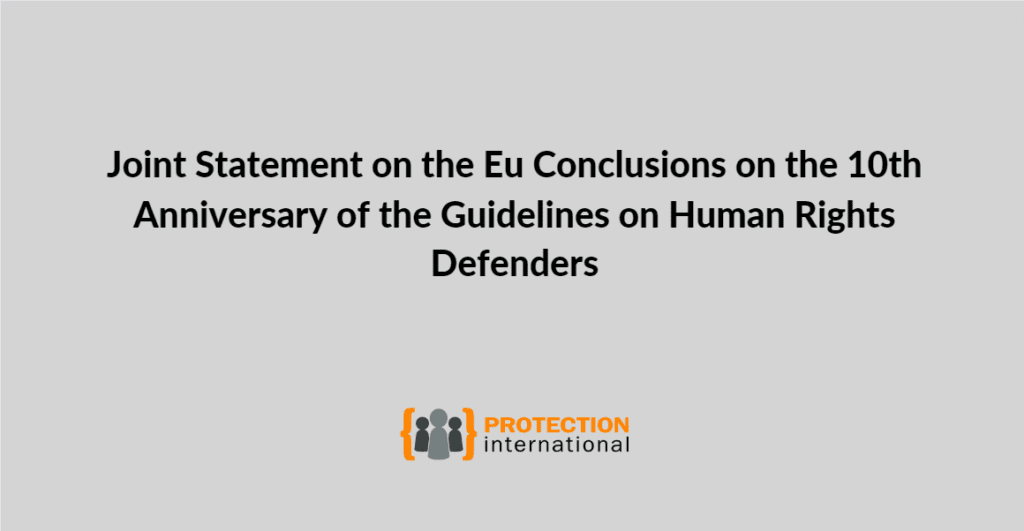The undersigned organisations working with and for human rights defenders (HRDs) welcome the adoption by the Council of the European Union (EU) of the 23 June 2014 Conclusions on the 10th Anniversary of the EU Guidelines on Human Rights Defenders. We express satisfaction with the renewed commitment of the EU and its Member States to the implementation of the Guidelines. In particular, we welcome the call for improved support to vulnerable and marginalized human rights defenders, women HRDs and those operating in remote regions. We also greet commitments to the creation of a safe and enabling environment, the continued effort to implement an effective and coherent policy on HRDs and the need to raise awareness and train Member States and EU staff on the HRD Guidelines in cooperation with civil society. We wholly support the importance given to interacting with and assisting different international and regional mechanisms for the protection of HRDs while giving increased attention to the phenomenon of reprisals.
The undersigned organizations stress the importance of reinforced efforts towards the full implementation of the Guidelines. In order to facilitate the fulfillment of the EU’s renewed commitment, we make the following recommendations for concrete actions to be taken by the EU and its Member States at field and capital levels, and we encourage the Council of the EU to include these recommendations in the soon-to-be revised EU Action Plan on Human Rights and Democracy :
Coherent EU policy on HRDs:
− Implement the EU Guidelines on HRDs fully and genuinely in all third countries, regardless of political, economic or other considerations;
− Actively support HRDs through a flexible combination of concrete actions and public diplomacy, on the basis of effective consultation with concerned HRDs;
− Clearly communicate human rights priorities of EU country strategies to local HRDs to facilitate their action;
− Provide systematic feedback to HRDs, civil society and the public on EU and Member States’ actions on HRDs, encouraging meaningful public debate on how to reinforce their vital efforts;
− Improve inter-institutional cooperation on HRDs by setting up a ‘filter group’ made of focal points, from the European Parliament, the European External Action Service and the European Commission, to meet regularly , review and follow-up individual cases, and prepare future actions in close cooperation with HRDs liaison officers in the field.
Support to all HRDs, including vulnerable and marginalized HRDs, women HRDs and those operating in remote areas:
− Use all means available to the EU and its Member States, including both diplomacy and concrete actions such as trial observation, as well as funding, visibility and political backing, to give meaningful support to HRDs.
− Regularly and consistently use political and human rights dialogues as well as other channels of communication to remind third countries of their duty to protect HRDs, and ensure involvement of HRDs in these processes.
information on the human rights situation, meet the protection needs of HRDs and provide visibility for their essential work to promote and protect human rights.
Safe and enabling environment:
− Promote and implement EU and Member State public information campaigns in third countries to increase the visibility and legitimacy of the work of HRDs, focusing in particular on the most vulnerable groups;
− Accompany and support efforts of civil society organizations in their demands towards government authorities to abrogate restrictive laws and norms, to adopt and/or strengthen national public policies and mechanisms for the protection of HRDs, and to fight against impunity.
Raising awareness about the Guidelines:
− Set up indicators and benchmarks to encourage concrete action on the Guidelines by all Member State diplomatic missions and EU Delegations;
− Translate the Guidelines on HRDs into local languages and disseminate them among civil society, including different ethnic minority groups and indigenous communities;
− Organise yearly regional workshops with the participation of civil society to exchange experiences and lessons learned, and build the capacity of HRDs, EU and Member States diplomatic staff, in particular the human rights focal points and liaison officers for HRDs.
We look forward to continuing our exchange with the EU and its Member States and remain engaged to support the work of HRDs in their crucial role of promoting and protecting human rights worldwide.
Brussels, 30 June 2014
Amnesty International Protection International, Frontline Defenders Peace Brigades International, The Observatory for the Protection of Human Rights Defenders


